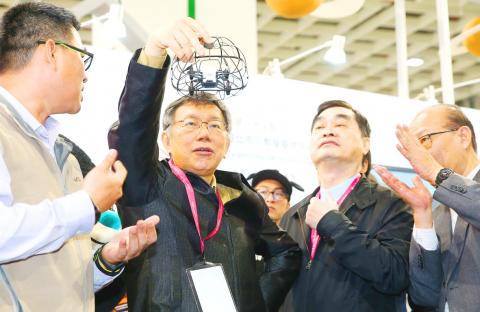The Smart City Summit and Expo opened at the Taipei Nangang Exhibition Center yesterday.
The expo, which runs until Friday, is cohosted by the Taipei Computer Association and the Taipei City Government. The nation’s information and communications technology industry used the show to present its smart city solutions, and it is also one of the biggest exhibitions in Asia for Internet of Things applications.
This is the sixth year that Taipei has hosted the annual event, Taipei Mayor Ko Wen-je (柯文哲) said at the opening, adding that the show’s scale has grown each year since the city first cohosted it in 2016.

Photo: CNA
More than 1,700 professionals from 42 countries and regions are expected to attend, including 128 city leaders who participated in a mayor’s summit, Ko said.
The mayors would also attend a launch event today for the Global Organization of Smart Cities initiative, he added.
This year’s expo features 1,260 booths representing 337 companies, nine themed booths representing foreign cities and 15 themed booths for local cities, including the “Smart Taipei, One City” booth by the Taipei City Government, which displays 31 innovative technology applications and services.
At the summit, Ko said the city government has been cooperating with the private sector and academics to make the city a living laboratory for innovative ideas and smart city solutions.
Taipei Deputy Mayor Teng Chia-chi (鄧家基) gave a keynote speech on the city’s Smart City Vision.
Taipei Department of Information Technology Director Lu Hsin-ke (呂新科) said the city leaders — including officials from Prague; Fukuoka, Japan; Utrecht, the Netherlands; Los Angeles; and Sapporo, Japan — shared their views on the themes of “Power Up for Cities: Sustainable Cities that Connect with Industries” and “Smart City and Innovative Entrepreneurship.”
In addition, Ko and Fukuoka Mayor Soichiro Takashima signed a memorandum of understanding (MOU) to enhance smart city exchanges and achieve a livable city with sustainable development.
Ko and Utrecht Deputy Mayor Klaas Verschuure signed an MOU to achieve sustainable development goals thorough the exchange of information and experiences.
Ko said that the two cities have many common aspects, such as a commitment to smart city development, sustainable management, speeding up innovation and enhancing their competitiveness, adding that they can exchange ideas on sustainable public transportation, healthcare and other issues.
Ko also accompanied Verschuure on a YouBike ride around Taipei City Hall, with city mascots Bravo the Bear from Taipei and Miffy from Utrecht greeting them in front of city hall when they returned.

AGING: As of last month, people aged 65 or older accounted for 20.06 percent of the total population and the number of couples who got married fell by 18,685 from 2024 Taiwan has surpassed South Korea as the country least willing to have children, with an annual crude birthrate of 4.62 per 1,000 people, Ministry of the Interior data showed yesterday. The nation was previously ranked the second-lowest country in terms of total fertility rate, or the average number of children a woman has in her lifetime. However, South Korea’s fertility rate began to recover from 2023, with total fertility rate rising from 0.72 and estimated to reach 0.82 to 0.85 by last year, and the crude birthrate projected at 6.7 per 1,000 people. Japan’s crude birthrate was projected to fall below six,

US President Donald Trump in an interview with the New York Times published on Thursday said that “it’s up to” Chinese President Xi Jinping (習近平) what China does on Taiwan, but that he would be “very unhappy” with a change in the “status quo.” “He [Xi] considers it to be a part of China, and that’s up to him what he’s going to be doing, but I’ve expressed to him that I would be very unhappy if he did that, and I don’t think he’ll do that. I hope he doesn’t do that,” Trump said. Trump made the comments in the context

SELF-DEFENSE: Tokyo has accelerated its spending goal and its defense minister said the nation needs to discuss whether it should develop nuclear-powered submarines China is ramping up objections to what it sees as Japan’s desire to acquire nuclear weapons, despite Tokyo’s longstanding renunciation of such arms, deepening another fissure in the two neighbors’ increasingly tense ties. In what appears to be a concerted effort, China’s foreign and defense ministries issued statements on Thursday condemning alleged remilitarism efforts by Tokyo. The remarks came as two of the country’s top think tanks jointly issued a 29-page report framing actions by “right-wing forces” in Japan as posing a “serious threat” to world peace. While that report did not define “right-wing forces,” the Chinese Ministry of Foreign Affairs was

PREPAREDNESS: Given the difficulty of importing ammunition during wartime, the Ministry of National Defense said it would prioritize ‘coproduction’ partnerships A newly formed unit of the Marine Corps tasked with land-based security operations has recently replaced its aging, domestically produced rifles with more advanced, US-made M4A1 rifles, a source said yesterday. The unnamed source familiar with the matter said the First Security Battalion of the Marine Corps’ Air Defense and Base Guard Group has replaced its older T65K2 rifles, which have been in service since the late 1980s, with the newly received M4A1s. The source did not say exactly when the upgrade took place or how many M4A1s were issued to the battalion. The confirmation came after Chinese-language media reported